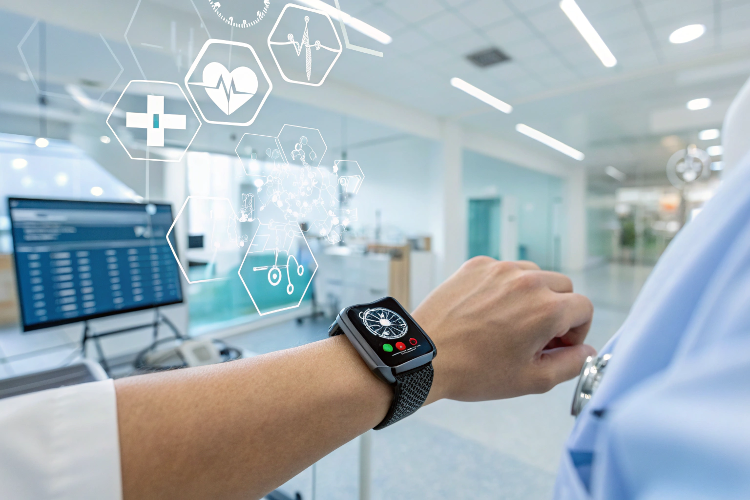Blog
How Biosensors are Revolutionizing Personalized Healthcare ?
Health & Wellness Tech ▪ 2025-03-20

The healthcare industry is undergoing a technological transformation, with biosensors emerging as a game-changer in personalized healthcare. Biosensors allow for real-time health monitoring, early disease detection, and more precise, patient-centric treatments.
In 2025 and beyond, wearable biosensors, implantable devices, and smart diagnostics are reshaping how individuals and healthcare providers track vital signs, chronic conditions, and overall wellness. From glucose monitoring for diabetics to real-time ECG tracking, biosensors enable better patient outcomes, lower healthcare costs, and more efficient treatment strategies.
In this blog, we’ll explore:
✅ What are biosensors?
✅ How do biosensors work in healthcare?
✅ The benefits of biosensors for personalized medicine
✅ The latest innovations in biosensor technology
✅ Future trends in biosensor-driven healthcare
Let’s dive into how biosensors are shaping the future of personalized healthcare.
1️⃣ What Are Biosensors?
🚀 Biosensors are analytical devices that detect biological information and convert it into measurable data.
A biosensor consists of:
🔹 Bioreceptor – Detects biological molecules (e.g., enzymes, antibodies, DNA).
🔹 Transducer – Converts biological responses into electrical signals.
🔹 Signal Processor – Analyzes and interprets data for real-time monitoring.
These devices continuously measure physiological signals like:
✔ Blood glucose levels
✔ Heart rate & ECG patterns
✔ Oxygen saturation (SpO2)
✔ Electrolytes & hydration levels
✔ Hormone fluctuations
💡 Example: Continuous glucose monitoring (CGM) biosensors help diabetics track glucose levels in real-time, reducing the risk of hypoglycemia.
🔗 Pro Tip: Biosensors are advancing precision medicine by tailoring treatments to individual patient needs.
2️⃣ How Biosensors Are Used in Healthcare
🚀 Biosensors enable real-time, non-invasive, and accurate monitoring of key health metrics.
✅ Applications of Biosensors in Healthcare
| Application | Function | Example Biosensor |
|---|---|---|
| Diabetes Management | Tracks glucose levels in real-time without finger pricks. | Freestyle Libre (CGM Sensor) |
| Cardiac Monitoring | Detects irregular heart rhythms and early signs of cardiovascular disease. | Zio Patch ECG Monitor |
| Wearable Fitness Tracking | Monitors heart rate, sleep patterns, and hydration. | Apple Watch, Fitbit |
| Infectious Disease Detection | Rapid diagnostics for COVID-19, flu, and bacterial infections. | CRISPR-based Biosensors |
| Neurological Monitoring | Tracks brain activity and detects seizures or neurological disorders. | EEG Wearables |
💡 Example: Wearable ECG biosensors are revolutionizing cardiac care by enabling early detection of arrhythmias before symptoms appear.
🔗 Pro Tip: Biosensors are paving the way for proactive, preventative healthcare.
3️⃣ The Benefits of Biosensors in Personalized Healthcare
🚀 Why are biosensors transforming medicine?
✅ Early Disease Detection – Identify health conditions before symptoms worsen.
✅ Continuous Monitoring – 24/7 real-time tracking of key health metrics.
✅ Remote Patient Monitoring (RPM) – Enables doctors to track patients without hospital visits.
✅ Minimally Invasive or Non-Invasive – No need for frequent blood draws or hospital stays.
✅ Faster, More Accurate Diagnosis – Reduces misdiagnoses and enables precise treatment.
💡 Example: Smart contact lenses with biosensors can measure glucose levels in tears, reducing the need for blood tests in diabetics.
🔗 Pro Tip: Biosensors are improving patient care by shifting healthcare from reactive to preventative models.
4️⃣ Innovations in Biosensor Technology
🚀 Recent advancements in biosensor technology are making healthcare smarter and more efficient.
🔬 The Latest Breakthroughs in Biosensors:
🔹 Wearable Biosensors – Fitness trackers, smartwatches, and smart rings that monitor health in real time.
🔹 Implantable Biosensors – Microchip-based sensors that continuously monitor glucose, heart rate, and oxygen levels.
🔹 Smart Tattoos & Bio-Ink Sensors – Temporary tattoos that change color based on hydration and glucose levels.
🔹 CRISPR-based Biosensors – Next-gen biosensors that detect viral infections and genetic mutations.
🔹 AI-Integrated Biosensors – AI-powered analytics that improve accuracy and predictive healthcare insights.
💡 Example: A research team developed a biosensor tattoo that changes color based on hydration levels, helping athletes track dehydration.
🔗 Pro Tip: AI-powered biosensors will revolutionize predictive healthcare by forecasting health risks before they happen.
5️⃣ The Future of Biosensors in Healthcare
🚀 What’s next for biosensor-driven healthcare?
✅ AI + Biosensors – AI will analyze biosensor data for personalized health insights.
✅ 5G-Powered Remote Monitoring – Faster, real-time patient monitoring via 5G networks.
✅ Integration with Digital Health Records – Biosensors will sync directly with electronic medical records.
✅ Gene-Based Biosensors – DNA sensors will predict genetic disease risks earlier.
✅ Point-of-Care Biosensors – Rapid diagnostic biosensors will improve access to healthcare in remote areas.
💡 Example: Neural biosensors may soon help people with paralysis control devices with their thoughts.
🔗 Pro Tip: By 2030, biosensors will play a central role in predictive, precision, and preventative medicine.
Final Thoughts: How Biosensors are Revolutionizing Personalized Healthcare
🚀 Biosensors are bridging the gap between technology and healthcare, enabling smarter, more personalized, and more efficient patient care.
Key Takeaways:
✅ Biosensors enable real-time, non-invasive health tracking.
✅ They improve early disease detection and reduce hospital visits.
✅ Wearables, smart tattoos, and AI-powered sensors are shaping the future of medicine.
✅ AI and 5G will drive the next wave of biosensor innovations.
✅ Biosensors will make healthcare more personalized, preventative, and accessible.

